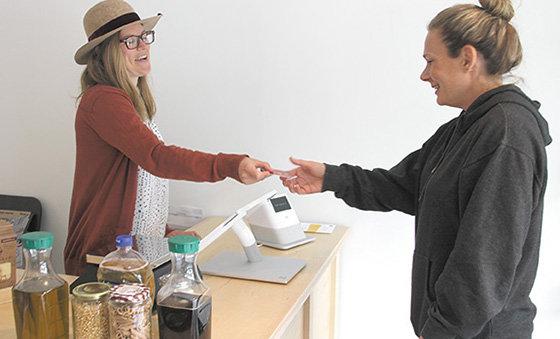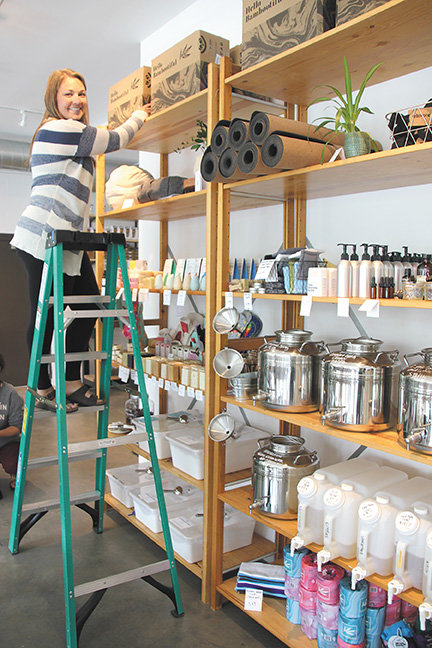By TESHA M. CHRISTENSEN
 Tare Market co-owner Amber Haukedahl (left) helps shopper Elise Coroneos who is working to minimize the impact her family has and is glad Tare Market has opened. She brought a number of different containers to fill with products. >> Read story on page 3. (Photo by Tesha M. Christensen)[/caption]
Tare Market co-owner Amber Haukedahl (left) helps shopper Elise Coroneos who is working to minimize the impact her family has and is glad Tare Market has opened. She brought a number of different containers to fill with products. >> Read story on page 3. (Photo by Tesha M. Christensen)[/caption] Two women who want to make sustainable living convenient and accessible have opened Minnesota’s first zero waste store.
Tare Market opened on Earth Day at 2717 E 38th St., the first shop in the new 3828 building’s commercial strip along 38th.
“We’re trying to do better,” explained shopper Elise Coroneos who lives in South Minneapolis. “It’s really hard in the regular grocery stores to do that.”
She pointed out that some things for zero waste living are more expensive while others are cheaper, and others have a higher cost at the start but then lower cost in the long run. “It’s a balancing act,” Coroneos said.
LOOKING FOR AN EASIER WAY TO DO ZERO WASTE
Tare Market owners Kate Marnach, age 33, and Amber Haukedahl, age 34, both began their own zero waste journey in 2017.
Haukedahl, who lives near Lake Nokomis with her husband, has a degree in conservation biology and has taught environmental education to urban youth and children with special needs. She started ZeroWasted.net in 2017 as a resource for others who wanted to live more sustainably.
Marnach also has a degree in biology along with one in business. Right now she lives in Maple Grove with her husband and three kids, but plans to move back to Minneapolis. She co-founded Zeroish.org in 2017 with two other local moms who wanted to provide information on the zero waste movement for parents with young children.
The two met at the South Minneapolis Green Fair in February 2018 hosted by the Nokomis East Neighborhood Association. They started talking about the problems they were facing as they tried to go zero waste. Some items were available locally at co-ops and Whole Foods, but others weren’t. Some could be found on Amazon, but they were still coming wrapped in plastic.
They began envisioning a better and easier way to do this.
They decided to open the state’s first zero waste store.
“We wanted to be a one-stop zero waste facility,” observed Marnach.
ONE-STOP ZERO WASTE SHOP
Marnach and Haukedahl picked the Standish-Ericsson neighborhood because the area had been identified as a food desert. They were also drawn to the transit options on 38th, and the close proximity to the lightrail station. Plus, they appreciated the focus on the building owner, The Lander Group, on fostering walkable communities, and wanted to be a part of that.
 Tare Market co-owner Kate Marnach stocks toilet paper and soaps that help
Tare Market co-owner Kate Marnach stocks toilet paper and soaps that helpSustainable living products at Tare Market includes items such as: reusable food wraps (to replace plastic wrap), bamboo cutlery to-go kits (to replace single-use plastic cutlery), reusable straws (to replace single-use plastic straws), compostable dental floss (to replace plastic dental floss), and bamboo toothbrushes (to replace plastic toothbrushes). Shampoo bars eliminate plastic bottles while also ensuring you don’t use too much at each shower (or that the kids don’t). Biodegradable hair ties are made of all-natural rubber and 100% cotton instead of plastics that don’t compost.
Fillaree soaps come in jugs that are returned to the store and then refilled. The coffee comes in big buckets that go between Tare Market and the store. While some products come in large plastic bags, there are the kind that are reusable and recyclable, versus the one-time-use individual pouches people usually get at the store, pointed out Marnach. “Any containers we can’t return, we reuse and offer for other people to reuse,” she added.
Through a partnership with Two Bettys Cleaners, Tare Market gets high concentrate cleaning supplies that come in big drums. This reduces carbon emissions from shipping and excess packaging.
If a company doesn’t offer bulk options or package-free items, Marnach and Haukedahl ask them to, and have found that some are accommodating. “Some products we can’t stock because we can’t find,” stated Marnach.
The item they get asked for most frequently that they can’t find is bulk white vinegar.
Tare Market isn’t allowed to carry any produce, meat or dairy, Marnach observed.
It took awhile, but they were able to find bulk ketchup, mustard and BBQ sauce. Other items, such as lotions in one-gallon containers, they’ve started with while they continue looking for better alternatives.
The area with snacks such as granolas, dried fruit, and popcorn, is popular. Their make-up is also a good seller, as buyers get a compact once that is made of bamboo, and then purchase tins of the make-up later that come in seed paper. The tins can be recycled.
BEST SWITCH: FROM TISSUES TO HANKIES
The switch that Marnach made at home that is her favorite was a move to hankies instead of tissues. It happened after one day when all three kids were sick, and they went through an entire box of tissues. Marnach thought, “What a giant waste of money.” She bought 20-25 hankies which can be reused over and over, and discovered an added benefit. They don’t make your nose raw.
Like many of the zero waste strategies out there, the use of hankies isn’t a new one.
“This is just getting away from what we’ve all gotten so used to lately with single-use items,” remarked Marnach.
KIDS ARE LEADING THE WAY
While Tare Market’s Instagram followers are primarily women in their 20s and 30s, they’ve found that people of all ages are shopping at Tare Market. Some come there because they’ve heard about it while others pop in because they are walking past and want to check it out.
“My favorite thing is all of the kids that are basically dragging their parents in here,” said Marnach. “Those age 8-15 are very concerned about sustainability and recognize that they have a long time to live on the earth. It’s easy for them to change and adopt new habits,” Marnach pointed out, in contrast to the adults who might not want to change.
“The kids are leading the way.”
Bridget Letmes of New Brighton has been working to have a zero-ish waste lifestyle with her family of five, driven by environmental concerns. “It’s great to hear my nine-year-old say, ‘I’ve got to have a home lunch today because the tacos come in a bag.’”
The Letmes family is down to one bag of trash a week. Her daughter, who is old enough to drive, brings their compost to the Ramsey County facility.
Letmes has learned that to be zero waste, you need to plan ahead and prepare stuff -- such as getting jars and containers ready to bring to the store with you.
ANSWERING QUESTIONS, HOLDING WORKSHOPS
Tare Market owners Marnach and Haukedahl see themselves as more than shop owners, and envision their role as helping educate people on zero living. They offer regular workshops such as DIY salve making, mindful mending, backyard composting, indoor worm composting, and transitioning your home to zero waste. In addition to sharing knowledge, these classes help build community, Marnach pointed out. After a DIY salve class in May, participants hung around another hour because they were enjoying their conversation.
“The fact that this will be the first zero waste store in Minnesota means we’re getting that opportunity and seeing that leadership right here in our community, and is all the more reason to support this concept so that it’s successful and replicated across the entire state,” stated Ward 12 Council Member Andrew Johnson.
“We each have a personal responsibility to be less wasteful and reduce our negative impacts, and Tare Market will help with that.”
>> The average American generates over 4 pounds of trash per day?
>> The methane gas released from the rotting trash in landfills warms the planet 86 times more than carbon dioxide in the first two decades it is released, before turning into carbon dioxide itself?
>> The average plastic bag is used for 12 minutes and can then take up to 1,000 years to decompose in a landfill?
>> Only 9% of plastics used actually get recycled?
>> The pumps in shampoo battles can’t be recycled?
“This is a visionary concept that’s long overdue. All that single-use packaging from food and lifestyle products has a huge cost to the environment and society. It’s immensely wasteful to manufacture and transport all that bulky material just to throw it away. When it gets recycled, it still has a carbon footprint, as it takes energy to pick-up and process. What’s worse is that not everyone recycles, so too much of it ends up at the HERC burner downtown and results in pollution that has increased childhood asthma rates and other health problems in our city. And regardless, we end up paying more than we otherwise need to - whether in the form of hundreds of dollars per year that each household spends on their solid waste utility bill, or at the checkout where packaging costs are added to the price of goods.
It’s time we have options for consumers to shop
in a smarter and more sustainable way.”
~ Ward 12 Council Member Andrew Johnson
Comments
No comments on this item Please log in to comment by clicking here